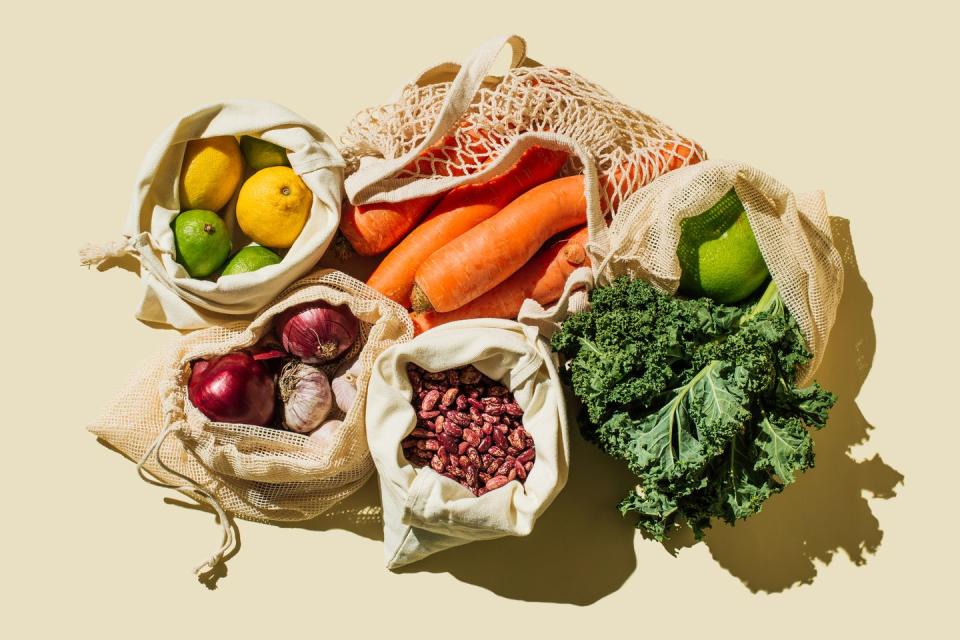Should You Be Taking a Fiber Supplement?

SAD BUT TRUE: Only roughly 5% of American men are getting the recommended daily amount of dietary fiber. Does that mean more people need to be taking a fiber supplement?
“Fiber is a type of carbohydrate that comes from plant foods and cannot be digested or absorbed,” says Kim Yawitz, R.D., a registered dietitian and gym owner based in St. Louis. “It's best-known for promoting regular bowel movements, but it can also help you manage your weight and lower your risk of heart disease, diabetes, and certain types of cancer.”
For men 19–50 years old, the daily recommended intake of fiber is 38 grams, and for men over 50, it's 30 grams. If you're not hitting those numbers, should you be taking fiber supplement? Keep reading to learn more about fiber, the various types of fiber supplements, and if a fiber supplement may be a good option for you.
What are the health benefits of fiber supplements?
Some guys find it challenging to get the recommended 38 grams daily from diet alone, and this is where supplements might come in handy, Yawitz says. There are a few health benefits of fiber supplements, but there is a caveat, says Maelee Wells Sutton, R.D.N., C.P.T., a personal trainer and dietitian at Endocrine Associates of West Village in New York City. Most of these studies are showing such positive results through dietary changes and supplementation—not supplementation alone. There's very limited research on fiber supplements on their own. So, take these with a grain of salt as you read through.
Promotes Digestion
Promotion of digestive health is the most notable benefit of fiber supplements.
Most fiber supplements consist mainly of soluble fiber, which can ease constipation by softening and bulking up the stool. “Insoluble fiber can also help prevent constipation by speeding up the rate at which food moves through the digestive system,” she says.
Weight Management
Fiber is indigestible, so it has the great power of keeping you fuller, longer. That might help prevent overeating at meals, or snacking in between meals—both of which help limit excessive calorie intake.
Betters Blood Levels
Fiber supplements may also help you keep your cholesterol and blood sugar in check. “For example (and per the FDA), taking either 3 grams of beta-glucan or 7 grams of psyllium daily can help you lower your total and LDL (‘bad’) cholesterol,” she says. “In a recent clinical trial, adults with type 2 diabetes saw significant improvements in blood sugar after taking 5 grams of beta-glucan daily for 12 weeks.”
Decrease Blood Pressure
It might also help your heart health. A 2023 Nutrition Journal meta-analysis found that taking a 20 gram soluble fiber supplement a day can lower systolic blood pressure by 1.79 mm Hg.
What even is fiber?
Oh, just an MVP of our digestive system, healthy weight management, and so much more.
Lara Clevenger, R.D.N., C.P.T., a registered dietitian and personal trainer in Port Orange, FL, explains dietary fiber as the portions of plant foods that are resistant to human digestive enzymes. “Fiber is divided into soluble types, like pectin, which ferments in the colon, and insoluble types, like wheat bran, which add bulk and some fermentation occurs in the colon,” Clevenger says.
Dietary fiber has been shown to lower the risk of heart disease, stroke, hypertension, diabetes, obesity, and improve certain gut issues. “Plus, it has been shown to improve cholesterol levels, blood pressure, blood sugar levels in people with diabetes, help with regularity, aid in weight loss, and boost immunity,” she says.
It may be helpful to note that soluble fiber dissolves in water, forming a gel, while insoluble fiber doesn't dissolve in water, shares Yawitz. Your body needs both types. Whole foods with loads of fiber include:
Beans
Avocado
Broccoli
Leafy greens
Lentils
Artichokes
Quinoa
Chickpeas
Chia seeds
Almonds

What to Know About Fiber Supplementation
Though fiber supplements can help to compensate for fiber deficits, it’s ideal to consume fiber from what’s on your plate (or bowl, or cup).
“It's always best to get fiber from real foods, which offer a much broader range of nutrients than supplements,” says Yawitz. Foods such as black beans are an excellent source of fiber (providing 15 grams per cup), but they're also rich in folate, copper, thiamine, manganese, magnesium, iron, phosphorus, and potassium. Meanwhile, fiber supplements only contain fiber, so as you can gather, you’re missing out on a lot of other potent nutrition specs.
If you're struggling with digestion issues, your doctor or nutritionist might suggest taking a supplement. If that's the case, the type you take depends on what desired outcomes you seek. “If you’re constipated, you may want an insoluble fiber supplement, whereas if you’re a diabetic looking for a little help improving your blood sugar, then you’ll want a soluble fiber supplement,” Yawitz says.
Talk to your healthcare provider about what kind of fiber supplement, if any, might best suit your needs.
Side Effects of Fiber Supplements
A fair word of warning if you do get the green light to go ahead with a fiber supplement: some people find that sudden increases in their fiber intake, especially through supplements, result in negative side effects such as gas, cramping, and bloating, says Wells Sutton. They can also lower the effectiveness of certain medications, like antidepressants and diabetes meds.
If you start one, make sure it’s one that’s third-party tested (look for an NSF or Informed Choice seal on the packaging) and make sure you are drinking a lot of water to allow the fiber to work in your body to the best of its ability. The bottom line is that “while supplements might help, their impact pales in comparison to dietary fiber.”
The side effects of increasing your fiber intake shouldn’t be as severe if you’re doing so through food, but you’ll still want to work your way up gradually. There are a few easy ways to increase your fiber intake through food, Wells Sutton says:
Drink a smoothie instead of juice, where much of the fiber has been removed.
Eat a non-starchy vegetable (leafy greens, broccoli, brussel sprouts, etc.) with every meal.
Snack on fiber-rich foods like nuts, berries, and popcorn.
If your healthcare professional has approved you’re taking a fiber supplement, consult with them to see if they have a favorite brand or any guidelines. Here's a few of our favorites.
You Might Also Like

